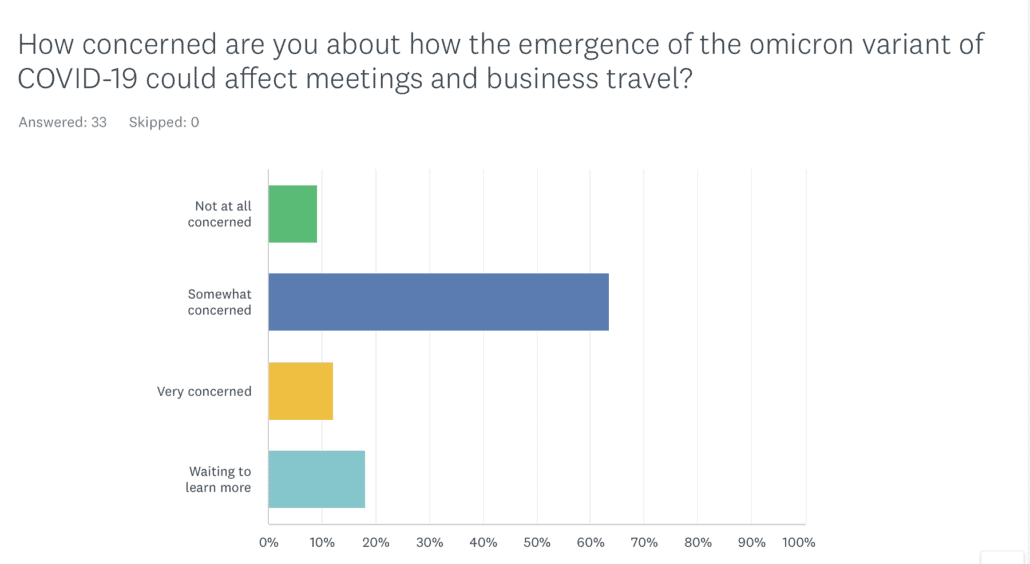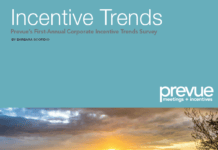Omicron’s effect on meetings may not become apparent until more is known about the latest COVID-19 variant’s contagiousness and the severity of disease it causes, said a group of planners surveyed by Prevue. The variant is already becoming prevalent in some areas of the world and has been detected in multiple U.S. states—but, so far, few meetings are canceling.
When it comes to Omicron’s effect on meetings, the majority of a group of 33 meeting and event professionals polled recently by Prevue said they were at least somewhat concerned (64%) about how the emergence of the Omicron variant could affect meetings and business travel, while 12% said they were very concerned. Another 18% said they were waiting to learn more. As one respondent said, “Can we wait a second and give the scientists some time to get us information before we, who are neither epidemiologists nor health professionals, make assumptions? This presuming without data and facts is promoting a potentially false and confusing narrative.”
Some seem to be taking that wait-and-see attitude when it comes to Omicron’s effect on meetings. The variant has not yet affected upcoming meetings and events for 77% of the 33 respondents to the recent Prevue poll, though they did say they were watching closely and would make a decision closer to the meeting’s dates once more is known about Omicron.

One respondent said, “We are monitoring it currently and will continue to monitor it (and all future variants). However, our company has a requirement of vaccination for all employees who are traveling for business and we are continuing with caution.” Another said they were responding by making masking mandatory instead of optional, while another noticed they had enough of an omicron-related uptick in ticket sales for the digital portion of a hybrid show that digital now is outpacing registration for the in-person event.
Just 3% each said the emergence of the new variant has caused them to cancel or postpone a meeting or event already. One respondent said they had both a cancelation and a postponement in the past couple of weeks, which affected about a quarter of their current monthly bookings. Another said that, while their events are going on as usual, they have seen attendance decrease as more participants cancelled due to Omicron concerns.
Another 17% said they don’t anticipate it have any effect on their upcoming meetings or events. But even if the Omicron variant is still too new to affect their upcoming events, one respondent said that they have had several meetings cancel for the first quarter of 2022 due to the continuing delta variant, especially since many companies do not want the liability of holding events when staff and attendees still are unvaccinated.
Respondents were fairly evenly split, with about a third each being corporate planners, another third being third-party/independent meeting managers and another third being those who plan events for an association/non-profit organization. Eighty-two percent said they planned large corporate events, while 62% said they planned large association annual conventions/trade shows. Another 17% each said they planned smaller corporate and association events.
COVID-Related Safety Requirements Still on the Agenda
Only 9% said they weren’t planning to have any COVID-related safety requirements in place for their upcoming meetings and events. The rest plan to implement a variety of protocols, including requiring masks in the conference space (64%), social distancing in the conference space (52%), requiring proof of vaccination either during pre-registration or on site (39% each), and requiring proof of a negative COVID test pre-con (36%) or on site (30%). Temperature checks at the entrance to the conference space also were being planned by 27%, though just 6% said they planned to use all the above COVID protocols.
Several of the 36% who were third-party/independent meeting managers said their protocol requirements would vary depending on their individual client’s policies. Some are including vaccination requirements but not requiring participants to provide proof of vaccination, while others are only requiring non-vaccinated participants to wear masks while on site. Several also said they their requirements would follow local, state and country guidelines at the time of their event. The vast majority of respondents, 96%, said their meetings were scheduled within the next three months.
Omicron’s Effect on Meetings Internationally
Travel requirements for international travelers keep changing — including a recent update requiring anyone who wants to enter the U.S. to show proof of a negative COVID test taken within 24 hours of departure. While 59% said they think these changes will make international travel to meetings less likely, another 22% think it will have the reverse effect and making people more likely to cross borders to attend an event, while another 19% said they don’t think these changes will have any impact.
As one respondent said, “This change will increase our travels. We would love to see all air travel require a negative test before departure.” Another said the changing requirements won’t be an issue for some, while it could be “a major hurdle for others. It depends on whether the client’s international protocols match up with the entry requirements for the international destination.” In fact, one planner noted that they are seeing lower in-person numbers for a January 2022 hybrid event due to cancellations and attendees opting for the virtual experience. While this was true for both domestic and international attendees, that person noted it was more prevalent among international attendees.
Another was pragmatic about the issue, saying, “You just have to adjust your plan accordingly.”
One respondent whose 2022 calendar is jam-packed said of Omicron’s effect on meetings, “I’m hoping we move forward with these and accept that there will be COVID cases no matter what.” One predicted that, by mid-2022, corporate travel will again be on the upswing. “We can’t stay home or on Zoom forever.”
Another said, “We need to shift our mindset. We keep thinking this is just going to be over one day. Sure, that might happen eventually, but with the vaccine disparity around the world, it’s going to be a while. Until there are actual government mandates, we can’t cancel contracts on force majeure clauses. We have to use the tools and knowledge at our disposal to meet safely given the conditions at the time.”
You Might Also Be Interested In
Omicron Variant Is Already Impacting In-Person Events
Are Self-Test Kits the Answer for New Travel Requirements?
Don’t Loosen COVID Precautions Yet











